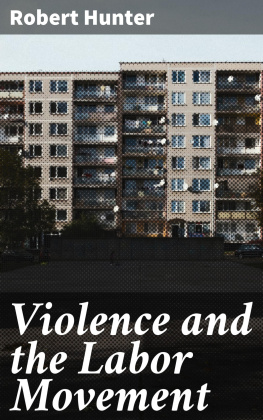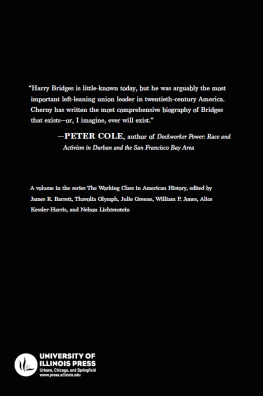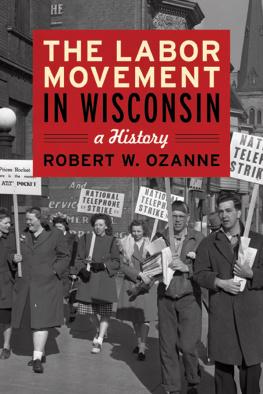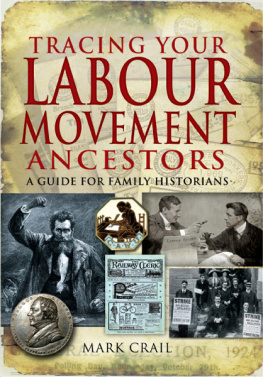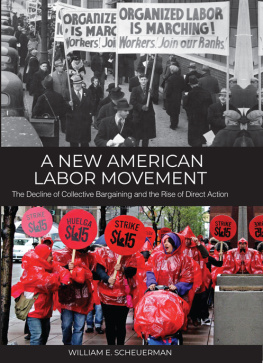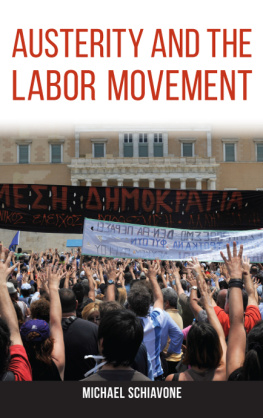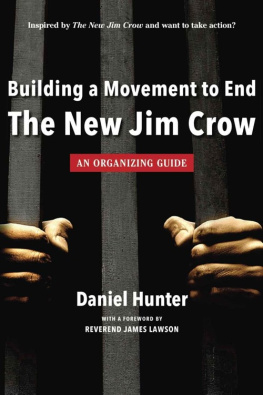ROBERT HUNTER
AUTHOR OF "POVERTY," "SOCIALISTS AT WORK," ETC.
New York
THE MACMILLAN COMPANY
1922
PRINTED IN THE UNITED STATES OF AMERICA
Copyright, 1914
By THE MACMILLAN COMPANY
Set up and electrotyped. Published March, 1914.
FERRIS
PRINTING COMPANY
NEW YORK CITY
THIS VOLUME IS AFFECTIONATELY DEDICATED
BY THE AUTHOR TO
EUGENE V. DEBS
"ONE WHO NEVER TURNED HIS BACK BUT
MARCHED BREAST FORWARD,
NEVER DOUBTED CLOUDS WOULD BREAK,"
AND
D. DOUGLAS WILSON
WHO, THOUGH PARALYZED AND BLIND, HAS SO LONG AND
FAITHFULLY BLAZED THE TRAIL FOR LABOR
PREFACE
This volume is the result of some studies that I felt impelled to make when, about three years ago, certain sections of the labor movement in the United States were discussing vehemently political action versus direct action. A number of causes combined to produce a serious and critical controversy. The Industrial Workers of the World were carrying on a lively agitation that later culminated in a series of spectacular strikes. With ideas and methods that were not only in opposition to those of the trade unions, but also to those of the socialist party, the new organization sought to displace the older organizations by what it called the "one Big Union." There were many in the older organizations who firmly believed in industrial unionism, and the dissensions which arose were not so much over that question as over the antagonistic character of the new movement and its advocacy here of the violent methods employed by the revolutionary section of the French unions. The most forceful and active spokesman of these methods was Mr. William D. Haywood, and, largely as a result of his agitation, la grve gnrale and le sabotage became the subjects of the hour in labor and socialist circles. In 1911 Mr. Haywood and Mr. Frank Bohn published a booklet, entitled Industrial Socialism, in which they urged that the worker should "use any weapon which will win his fight."
The advocacy of such doctrines alarmed the older socialists, who were familiar with the many disasters that had overtaken the labor movement in its earlier days, and nearly all of them assailed the direct actionists. Mr. Eugene V. Debs, Mr. Victor L. Berger, Mr. John Spargo, Mr. Morris Hillquit, and many others, less well known, combated "the new methods" in vigorous language. Mr. Hillquit dealt with the question in a manner that immediately awakened the attention of every active socialist. Condemning without reserve every resort to lawbreaking and violence, and insisting that both were "ethically unjustifiable and tactically suicidal," Mr. Hillquit pointed out that whenever any group or section of the labor movement "has embarked upon a policy of 'breaking the law' or using 'any weapons which will win the fight,' whether such policy was styled 'terrorism,' 'propaganda of the deed,' 'direct action,' 'sabotage,' or 'anarchism,' it has invariably served to demoralize and destroy the movement, by attracting to it professional criminals, infesting it with spies, leading the workers to needless and senseless slaughter, and ultimately engendering a spirit of disgust and reaction. It was this advocacy of 'lawbreaking' which Marx and Engels fought so severely in the International and which finally led to the disruption of the first great international parliament of labor, and the socialist party of every country in the civilized world has since uniformly and emphatically rejected that policy."
There could be no better introduction to the present volume than these words of Mr. Hillquit, and it will, I think, be clear to the reader that the history of the labor movement during the last half-century fully sustains Mr. Hillquit's position. The problem of methods has always been a vital matter to the labor movement, and, for a hundred years at least, the quarrels now dividing syndicalists and socialists have disturbed that movement. In the Chartist days the "physical forcists" opposed the "moral forcists," and later dissensions over the same question occurred between the Bakouninists and the Marxists. Since then anarchists and social democrats, direct actionists and political actionists, syndicalists and socialists have continued the battle. I have attempted here to present the arguments made by both sides of this controversy, and, while no doubt my bias is perfectly clear, I hope I have presented fairly the position of each of the contending elements. Fortunately, the direct actionists have exercised a determining influence only in a few places, and everywhere, in the end, the victory of those who were contending for the employment of peaceable means has been complete. Already in this country, as a result of the recent controversy, it is written in the constitution of the socialist party that "any member of the party who opposes political action or advocates crime, sabotage, or other methods of violence as a weapon of the working class to aid in its emancipation shall be expelled from membership in the party." Adopted by the national convention of the party in 1911, this clause was ratified at a general referendum of all the membership of the party. It is clear, therefore, that the immense majority of socialists are determined to employ peaceable and legal methods of action.
It is, of course, perfectly obvious that the methods to be employed in the struggles between classes, as between nations, cannot be predetermined. And, while the socialists everywhere have condemned the use of violent measures and are now exercising every power at their command to keep the struggle between labor and capital on legal ground, events alone will determine whether the great social problems of our day can be settled peaceably. The entire matter is largely in the hands of the ruling classes. And, while the socialists in all countries are determined not to allow themselves to be provoked into acts of despair by temporary and fleeting methods of repression, conditions may of course arise where no organization, however powerful, could prevent the masses from breaking into an open and bloody conflict. On one memorable occasion (March 31, 1886), August Bebel uttered some impressive words on this subject in the German Reichstag. "Herr von Puttkamer," said Bebel, "calls to mind the speech which I delivered in 1881 in the debate on the Socialist Law a few days after the murder of the Czar. I did not then glorify regicide. I declared that a system like that prevailing in Russia necessarily gave birth to Nihilism and must necessarily lead to deeds of violence. Yes, I do not hesitate to say that if you should inaugurate such a system in Germany it would of necessity lead to deeds of violence with us as well. (A deputy called out: 'The German Monarchy?') The German Monarchy would then certainly be affected, and I do not hesitate to say that I should be one of the first to lend a hand in the work, for all measures are allowable against such a system." I take it that Bebel was, in this instance, simply pointing out to the German bureaucracy the inevitable consequences of the Russian system. At that very moment he was restraining hundreds of thousands of his followers from acts of despair, yet he could not resist warning the German rulers that the time might come in that country when no considerations whatever could persuade men to forego the use of the most violent retaliative measures. This view is, of course, well established in our national history, and our Declaration of Independence, as well as many of our State constitutions, asserts that it is both the right and the duty of the people to overthrow by any means in their power an oppressive and tyrannical government. This was, of course, always the teaching of what Marx liked to call "the bourgeois democrats." It was, in fact, their only conception of revolution.

